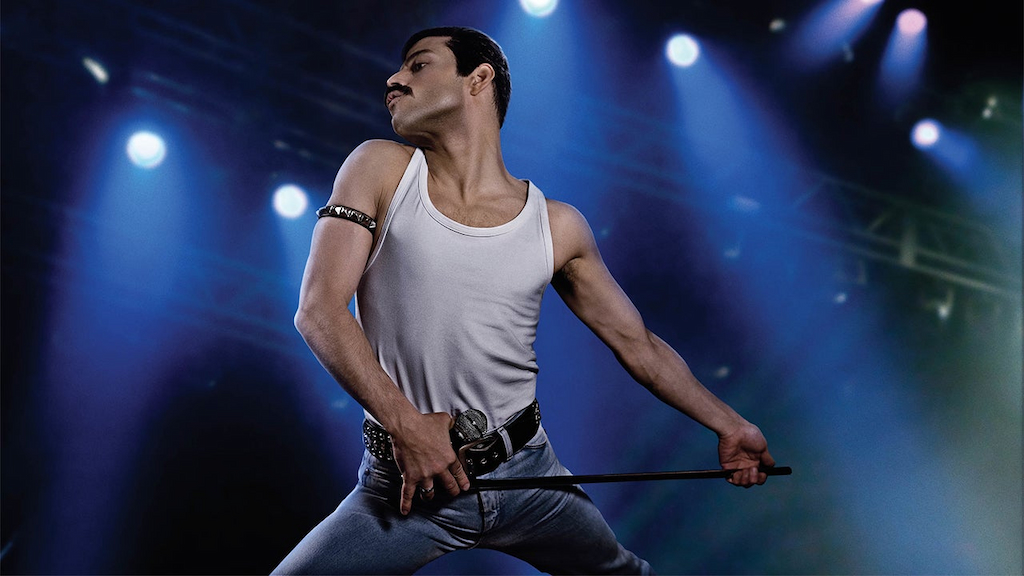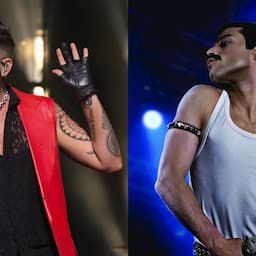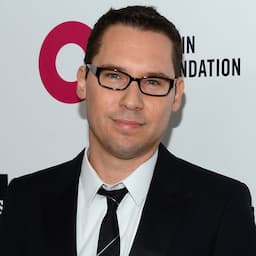Mike Myers, Lucy Boynton and Joseph Mazzello co-star in a look behind the curtain at the rise and fall and reunion of Queen.
Rami Malek's Freddie Mercury enters Bohemian Rhapsody teeth-first, Malek protruding and sucking on the faux chompers he wears to embody the late, great frontman of Queen. The prosthetics -- perhaps a bit more distinct than Mercury's own -- are directly addressed early on, when Farrokh "Freddie" Bulsara first auditions for a nascent rock band in need of a lead singer: He was born with four extra incisors, you see, which means more room in his mouth, which means "more range."
The teeth (plus the wigs and mustache, the skintight bellbottoms and leather jackets) are a catalyst for Malek's broader physicality: The way he, as Mercury, puckers his cheeks and turns up his nose, how he rigidly swaggers through a room, how he twists his arms akimbo, hands planted on his hips, and drawls dahrling. Malek's performance is mannered and perhaps a tad reliant on his mincing, but mesmerizing -- appropriately big for a personality as big as Mercury -- especially as he throws himself around the stage dressed in a leotard or white tank top. But what does Bohemian Rhapsody have to illuminate about the man behind the mannerisms?
Because, in the end, this is the Freddie Mercury show, not a biopic about Queen. The movie never digs into the lives of the other members of the band -- bassist John Deacon (Joseph Mazzello), guitarist Brian May (Gwilym Lee) and drummer Roger Taylor (Ben Hardy) -- except in how they alternatingly admire or are exasperated by Mercury. Really, the movie never digs deep on much at all. At a whopping two hours and 14 minutes, it all feels rushed along as Bryan Singer (who maintains the directing credit, despite being fired off the film during production) and screenwriter Anthony McCarten attempt to cover more than a decade in Mercury's life.
We meet young Freddie when he is slinging suitcases for TSA in 1970, then race through the years up to Queen's grand comeback performance in 1985, at the Live Aid benefit concert. That doesn't leave much real estate to nail down what makes Mercury tick, let alone explore the how or why or any of the minutia of what it takes to become a famous rock band. Queen becomes successful over two montages, essentially, with bits of dialogue to explain away why the band is named Queen ("As in her royal highness. And because it's outrageous," Mercury purrs, "and I can't think of anyone more outrageous than me!"), why Freddie adopts "Mercury" as his surname (in one scene he is Freddie Bulsara and the next he's not, and that's that on that) or what "Bohemian Rhapsody" means. ("Poetry is for the listeners," Mercury rebuffs.)
Where this cinematic skim reading is most noticeable -- and egregious -- is in Mercury's love life. The central relationship in the film is Mercury and Mary Austin (Lucy Boynton), a romance-turned-lifelong friendship after Mercury comes out as gay. (Or bi, the movie offers up both.) Their bond was significant to Mercury and worthy of thoughtful exploration, but here, it comes at the expense of any queerness in his life. He visits a leather gay bar in one musical montage, and we're told about his "countless lovers," but there's no fun, no sexiness or fulfillment, to his orientation. And then he is diagnosed with HIV. Both his status and his longer-term partnership with Jim Hutton (Aaron McCusker) ultimately feel like fleeting plot points the movie knew it had to hit on the way to its big finish.
There's a version of Bohemian Rhapsody that is maybe a little darker, a little deeper, that may cover less ground, overall -- I'd love to see a movie that's just about the year or so immediately leading to Live Aid (undeniably the best, most thrilling sequence in the movie) -- but as is, it plays like a Greatest Hits album. They're all there -- "Somebody to Love" and "We Will Rock You" and, of course, the titular track -- as the story bops through fights and parties and benders. It's big and shiny and loud and, certainly, there is enjoyment to be had along the way, but, unlike a standard album, there aren't any risks or surprises and there are no deep cuts.
RELATED CONTENT:



